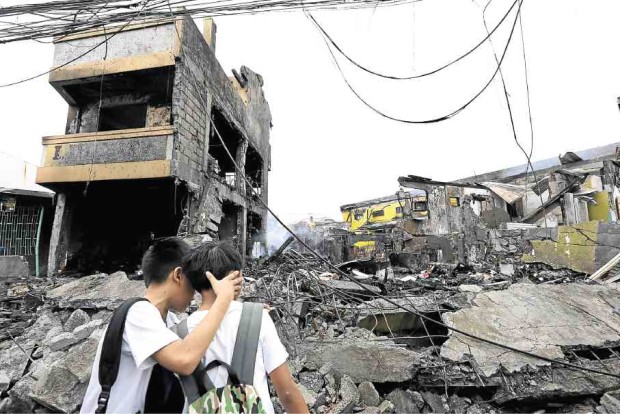
The Oct. 13 tragedy that set off a work stoppage order in the firecracker industry has reduced these structures in Bocaue town, Bulacan province, to rubble. —NIÑO JESUS ORBETA
The firecracker industry in Bulacan province and Iloilo City is likely to spring back to life after government orders to cease work in firecracker factories are being lifted as the holidays set in.
In Bulacan, Labor Secretary Silvestre Bello III on Thursday allowed 48 of 80 firecracker manufacturers and traders to resume operations, after they complied with health and safety regulations.
Bello lifted the work stoppage order he issued on Nov. 24 following the Oct. 12 blast that triggered a fire that killed two people and razed a row of fireworks stores in Bocaue town. Another explosion killed a woman and her children on Nov. 23 in Sta. Maria town.
Lawyer Ana Dione, director of the Department of Labor and Employment (Dole) in Central Luzon, said the 48 establishments complied with labor and occupational safety and health standards set by government.
More dangerous
In Iloilo City, a work stoppage order for firecracker makers may be lifted soon as the Bureau of Fire Protection (BFP) warned that prolonging it could do more harm than good.
Supt. Jerry Candido, Iloilo City fire chief, said a prolonged work stoppage order may drive firecracker makers and vendors to go underground.
“We are trying our best to fast-track the lifting of the work stoppage order,” Candido said.
He said makers and sellers, though, should comply with safety standards.
Small-scale firecracker makers and sellers in Iloilo City are appealing for leniency in the enforcement of the work stoppage order for the firecracker industry, saying they had already spent money to buy ingredients for the firecrackers and are ready to sell.
Hundreds of families in Iloilo City, especially in Arevalo District, depend on the manufacturing and selling of firecrackers and pyrotechnic materials.
Brisk sale
In Bulacan, the local governments and police would continue to monitor the operations of firecracker companies, according to regional labor chief Dione.
Businesses expect brisk sales of firecrackers and other pyrotechnic devices toward the end of the year.
The production and sale of fireworks and pyrotechnics are regulated by Republic Act No. 7183 (An Act Regulating the Sale, Manufacture, Distribution and Use of Firecrackers and other Pyrotechnic Devices).
Candido said he got information that some people started making firecrackers at home to evade detection by authorities.
“This poses greater risk,” Candido said.
The BFP in Iloilo, he said, has recommended the lifting of the work stoppage order on at least three firecracker manufacturing companies that have complied with safety standards.
The lifting of the order, however, also needs the approval of Dole, Candido said.
Police in Iloilo City, he added, have met with firecracker makers and sellers who agreed to sell their products in kiosks in public plazas instead of roadside stalls as they had been accustomed to.
The kiosks would have thick walls made of fiber cement. Samples would be on display and actual products would be stored in areas far from houses and other establishments. —TONETTE OREJAS AND NESTOR P. BURGOS